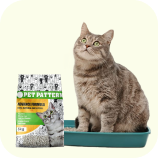Help us ensure a smooth delivery
SIZE GUIDE
Is Your Cat in Pain? Find the Right Pain Killer for Cats Here
If you’ve got a cat, you know how sneaky they can be about hiding when something’s wrong. One day, they’re racing down the hallway, and the next, they’re quiet, not eating, and skipping their favorite nap spot by the window. It’s not easy to figure out what’s going on, but you can just tell they’re not feeling great.
At Supertails, we know how much your cat means to you. They're not just a pet—they're part of the family. That’s why we’ve put together a bunch of safe, vet-approved cat pain relief options. Stuff that actually works and isn’t hard to give—like syrups, tablets, or drops. Whether your cat’s dealing with surgery pain, sore muscles, or just feeling off, we’ve got something to help them feel better.
Why Choose Supertails for Cat Pain Medicine?
- Vet-Approved Painkillers for Cats: Our range includes only safe, effective cat pain medicine, feline pain killers, and pain meds for cats trusted by veterinarians across India.
- Solutions for Every Situation: From post-surgery recovery to everyday aches, we’ve got pain remedies for cats that suit kittens, adults, and senior felines alike.
- Targeted Relief: Whether your cat needs ear infection treatment for cats, cat stomach pain medicine, or general pain medication for cats, you’ll find the right solution here.
- Easy to Use: Our cat meds for pain come in easy-to-administer forms—tablets, syrups, and drops—making medicine time stress-free for both you and your kitty.
- Fast Delivery, Pan-India: No more waiting when your cat’s in pain. Order online and get genuine, vet-recommended feline pain medicine delivered to your doorstep.
Pawsome Extras: UTI in Cats: Signs Every Pet Parent Must Know
Hurry Up! Explore Our Range of Pain Meds For Cats Now!
Melonex Oral Suspension
This one’s a liquid pain reliever with meloxicam. Works for both dogs and cats. Good choice if your pet doesn’t do well with pills. It’s often used for joint pain or recovery after surgery. Easy to give, just mix with food or use a dropper—but don’t guess the dose, always ask your vet.
Zeronac M Syrup
This syrup’s just for dogs. Helps with long-term joint pain and swelling. Especially helpful for older dogs with stiff legs or dogs healing from an injury. Easier to give than a tablet, and tends to work fast.
Metaflam Suspension
Also for dogs and also has meloxicam. Used for arthritis or when your dog’s hurting after surgery. Liquid format means you can be more exact with the amount, which helps when your pet’s picky or small.
Melonex 2.5mg Tablets
Same medicine, just in tablet form. Works for cats and dogs. Good for longer-term use, like ongoing joint problems. You can split the dose if needed, but again—only if your vet says it’s okay.
Ultrafix Forte Tablets
Different type of pain med. These have a combo of ingredients that help with swelling and healing, especially from wounds or dental stuff. Works for both cats and dogs. More than just pain relief—it helps them bounce back a little faster too.
Bonus care for your cat’s comfort
Pain can show up in different ways, and not just in joints or after surgery. That’s why we’ve also included a few extras to make sure your cat gets the full care they need.
If you have a dog, check out our Dog pain relief collection. If your cat’s been scratching their ears or shaking their head more than usual, they might be dealing with an ear infection. We’ve got gentle, effective ear infection medicine for cats that helps soothe irritation and clear things up quickly.
Dealing with tummy troubles instead? We also offer cat stomach pain medicine made just for cats. It’s easy on their system and helps settle discomfort so they can get back to eating, playing, and feeling like themselves again.
Give Your Cat the Comfort They Deserve With Our Pain Remedies for Cats
Don’t let pain steal your cat’s spark. Discover the best cat pain killer, pain medication for cats, and pain relief for cats—all in one place. Because when your cat feels better, your whole home feels brighter.
Explore our collection now and help your cat get back to their happiest, healthiest self!
FAQ
What can I give my cat for pain relief?
Only give your cat vet-approved medications like Meloxicam (Melonex) or Robenacoxib (Robenatail). These are safe when prescribed by a veterinarian. Avoid giving human painkillers, as they can be toxic and even fatal to cats. Always consult your vet before starting any pain treatment for your cat.
Are there over-the-counter pain meds safe for cats?
No, over-the-counter medications for humans are not safe for cats. Medications must be prescribed by a vet after a proper diagnosis. Vet-recommended products like Melonex or Metaflam are safe options when dosed correctly. Always seek veterinary advice before giving any medication to your cat.
How do I know if my cat is in pain?
Cats often hide pain, but signs include limping, reduced appetite, hiding, aggression, or avoiding touch. Excessive grooming or vocal changes can also indicate discomfort. If you notice unusual behavior or movement, it’s best to consult a veterinarian to identify the cause and begin safe pain relief.
Can I buy cat painkillers online?
Yes, you can buy safe, vet-approved cat pain medications online from trusted sites like Supertails. Products like Melonex Suspension and Robenatail Tablets are commonly available. Always ensure the site is reputable and follow your vet’s dosage instructions carefully to avoid complications.
What is the safest painkiller for cats?
Meloxicam (found in Melonex) and Robenacoxib (in Robenatail) are considered safe and effective for cats when prescribed by a vet. They help reduce inflammation and pain from surgery, arthritis, or injury. Never give medications without veterinary approval, as incorrect use can harm your cat’s health.
How long can a cat take pain meds?
The length of treatment depends on your cat’s condition. Short-term pain like post-surgery recovery may require a few days, while chronic issues like arthritis might need long-term care. Regular vet monitoring is essential to avoid side effects and ensure the medication remains effective and safe.
Can cats have human painkillers like ibuprofen or Tylenol?
No, human painkillers like ibuprofen and acetaminophen (Tylenol) are highly toxic to cats. Even small doses can lead to organ damage or death. Never attempt to treat your cat with medications meant for humans. Always consult a vet for feline-specific pain relief options.
Do senior cats need different pain relief than kittens?
Yes, senior cats may have reduced organ function, requiring lower doses or different medications. Vets typically recommend gentler options for older cats to avoid stress on the kidneys or liver. Always inform your vet of your cat’s age before starting any pain relief treatment.
What are the symptoms of pain in cats?
Symptoms of pain in cats include unusual hiding, decreased appetite, vocalizing (crying, growling), limping, reduced grooming or a scruffy appearance, irritability, reluctance to jump or play, and change in posture. Persistent symptoms should prompt a vet visit.
How is pain treated in cats?
Pain in cats is treated with vet-prescribed medications like Meloxicam, Robenacoxib, Gabapentin, or opioids for severe cases. Dosage and duration depend on the underlying cause and your cat’s age and health. Never give pain medicine to your cat without veterinary advice.
Are there natural pain relief options for cats?
Some natural remedies like fish oil (omega-3s), glucosamine, or joint-supporting supplements may help with mild pain or inflammation. However, efficacy is limited and these should not replace prescription treatments for significant pain. Always consult your vet before trying alternative therapies.
When should I give my cat pain medication?
Pain medications should only be given after your cat has been examined by a veterinarian and a proper diagnosis has been made. Follow your vet's prescription on when and how much medication to administer. Never self-medicate your cat or change the dose yourself.
What are the side effects of pain medications in cats?
Possible side effects include vomiting, diarrhea, lethargy, loss of appetite, or changes in urination. More serious effects, especially with NSAIDs, can involve kidney or liver issues, or gastrointestinal ulcers. Seek veterinary help if you notice any adverse reactions while your cat is on pain meds.





 Golden Retriever
Golden Retriever
 German Shepherd
German Shepherd
 Labrador
Labrador
 Rottweiler
Rottweiler
 Beagle
Beagle
 Preventive Care
Preventive Care
 System wise
System wise
 Supplements
Supplements




























































































































































